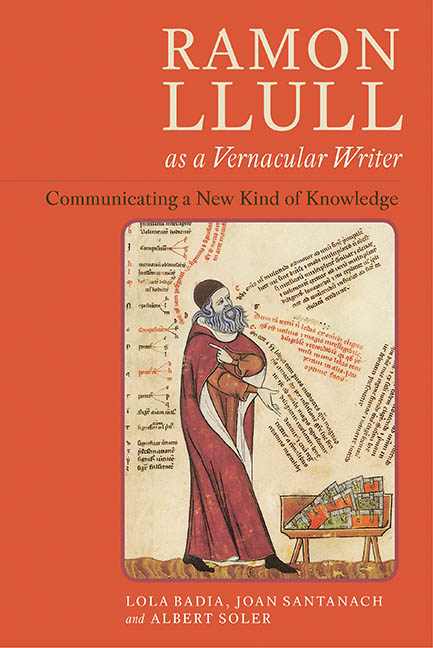Book contents
- Frontmatter
- Dedication
- Contents
- Illustrations
- Acknowledgements
- Abbreviations
- Introduction
- 1 Ramon Llull's Art, Language, and Literary Expression
- 2 Style and Genre in the Writings of Ramon Llull
- 3 The Composition and Dissemination of Ramon Llull's Texts, from Script to Print
- 4 Ramon Llull's Vernacular Context
- Epilogue. Ramon Llull's OEuvre as a Whole: Autobiographism and Self-Referentiality
- Appendix 1 First-Generation Llullian Manuscripts
- Appendix 2 Catalan Language and Literature in Relation to Ramon Llull
- Bibliography
- Index
3 - The Composition and Dissemination of Ramon Llull's Texts, from Script to Print
Published online by Cambridge University Press: 05 June 2016
- Frontmatter
- Dedication
- Contents
- Illustrations
- Acknowledgements
- Abbreviations
- Introduction
- 1 Ramon Llull's Art, Language, and Literary Expression
- 2 Style and Genre in the Writings of Ramon Llull
- 3 The Composition and Dissemination of Ramon Llull's Texts, from Script to Print
- 4 Ramon Llull's Vernacular Context
- Epilogue. Ramon Llull's OEuvre as a Whole: Autobiographism and Self-Referentiality
- Appendix 1 First-Generation Llullian Manuscripts
- Appendix 2 Catalan Language and Literature in Relation to Ramon Llull
- Bibliography
- Index
Summary
Vernacularization is a comprehensive process that conditions the conception and literary expression of the works in question. It likewise influences the adoption of a scripta and the development of styles that befit the genres to which it is applied, the way the texts are paginated and the selection of book formats, the procedures by means of which codices are produced, and the transmission and diffusion of the works themselves.
The opening sections of the current chapter analyse the acts of composing and copying Llull's texts, the works’ multilingualism both at the time of composition and of their dissemination, the mise en page of the texts and the earliest manuscript tradition as well as the strategies used for dissemination and preservation.
These aspects situate us in Llull's own time and in the immediately subsequent period; his works’ access to print, on the other hand, a topic which will be discussed later on in this chapter, forms a story that is indissolubly linked to Llullism from the fifteenth century to the present day, a story that would be completely unthinkable without the stubborn, creative and effective initial dedication of Ramon Llull himself to the preservation of his intellectual legacy.
At the end of this chapter, a survey of the Llullian critical editions produced during the twentieth and twenty-first centuries shows that it is, in every sense, essential to study the texts of Ramon Llull from the perspective of their vernacularity if one wishes to attain a correct understanding of them.
The Llullian scriptorium
Ramon Llull was an author heavily involved in the dissemination of his oeuvre. When it came to guaranteeing the transmission of his books, however, he found himself somewhat outside the established circuits: he was not a cleric, he belonged to neither a religious order nor a university faculty, and he was not in the service of a court. This presented serious drawbacks.
Llull's peculiar situation explains in part why he concerned himself so intensely with his oeuvre, and why he developed his own system for its production and dissemination. This system covered the composition, translation, copying, dissemination and preservation of a text. These five aspects could overlap and condition each other in unusual ways.
Information
- Type
- Chapter
- Information
- Ramon Llull as a Vernacular WriterCommunicating a New Kind of Knowledge, pp. 163 - 226Publisher: Boydell & BrewerPrint publication year: 2016
